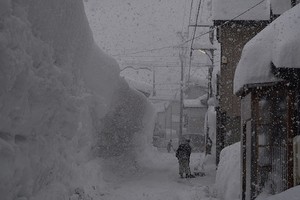Vox Populi, Vox Dei is a daily column that runs on Page 1 of The Asahi Shimbun.
May 24, 2022 at 11:52 JST
 Transport ministry staff enter the main office of Shiretoko Pleasure Boat in Shari, Hokkaido, to conduct a special audit on April 24, 2022, the day after the sinking. (Asahi Shimbun file photo)
Transport ministry staff enter the main office of Shiretoko Pleasure Boat in Shari, Hokkaido, to conduct a special audit on April 24, 2022, the day after the sinking. (Asahi Shimbun file photo)
Let's say you are an elementary schoolteacher and your students are back from summer vacation.
When the children hand in their "enikki" (illustrated diary) homework, you conclude that one of your students must have frequently shirked their daily assignment of writing a diary entry and recording the weather for each day.
The dead giveaway is the child just wrote "sunny" for the weather throughout the holidays.
You wouldn't overlook this anomaly and give the student a "hanamaru" stamp of excellence for the work, would you?
Of course not. You would obviously ask the child to explain what the problem was.
That was not the case, however, with Shiretoko Pleasure Boat, the operator of a tour boat that sank off Hokkaido on April 23, killing more than a dozen passengers.
The company caused two accidents last year, for which it submitted a safety improvement report to the transport ministry.
As I understand it, though, the report recorded exactly the same wave height and wind velocity for as long as 15 days.
Had the ministry noted the obvious shoddiness of the report and investigated the matter, perhaps the latest tragedy could have been averted.
It has been a month since the accident, and the government's dysfunctional inspection system has also come to light.
An inspection organization under the transport ministry's jurisdiction had received, and approved, an application from Shiretoko Pleasure Boat to switch from satellite to mobile phone communication.
Even though most of the company's service route was out of mobile range, the ministry simply believed the company's explanation to the contrary.
It was as if the company's on-site operation staff arbitrarily eased the government's safety regulations.
Regarding the latter, there once was an argument to the effect that even in the absence of strict rules, corporations would pay close attention to safety, since they knew they would not survive against their competition if they were branded unsafe.
Could it be that the officials overseeing the tour boat company subscribed to that argument?
But when the company is operated by people with little knowledge of, and experience in, their own business, the argument's premise, itself, becomes completely invalid.
However, even if the company is forced out of business and its executives punished, the lives lost can never be brought back.
--The Asahi Shimbun, May 24
* * *
Vox Populi, Vox Dei is a popular daily column that takes up a wide range of topics, including culture, arts and social trends and developments. Written by veteran Asahi Shimbun writers, the column provides useful perspectives on and insights into contemporary Japan and its culture.




















A peek through the music industry’s curtain at the producers who harnessed social media to help their idols go global.
A series based on diplomatic documents declassified by Japan’s Foreign Ministry
Here is a collection of first-hand accounts by “hibakusha” atomic bomb survivors.
Cooking experts, chefs and others involved in the field of food introduce their special recipes intertwined with their paths in life.
A series about Japanese-Americans and their memories of World War II